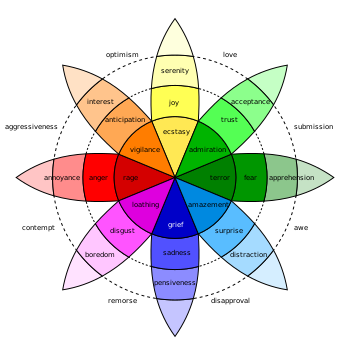 |
| Robert Plutchik's Wheel of Emotions (Wikipedia) |
Several triggers prompt this post. One is my own data from a set of questionnaires seeking supervisor experience [n226]: frustration, anger, despair and resentment came through significantly.
So did supervisors’ perception of how hard it is to give constructive feedback when doctoral students respond with alarmingly negative emotion. The causes of student emotion were also anatomised. This confirms findings with data from 36 doctoral students and 29 supervisors (Aitchison, Catterall, Ross, & Burgin, 2012).
The second was a conversation with a doctoral student colleague. Usually our talk is cheerful and agreeable. But when it came to her doctorate (she’s at the end of her third year) and her inability to write, we stopped the conversation, both cautious about a sense of rising emotion and difference of perspective.
She described how it is simply not her style to crank out writing - she wants to be innovative and do something special, but that causes indecision and she is not progressing. I was firm that she had to find a way to just get on and do it. She looked hot and bothered. I was too - why couldn’t my intelligent colleague see she needed to apply the lovely grounded logic she usually showed in her work? She sounded increasingly ditzy; I sounded increasingly authoritarian. Neither of us wanted to be like that, so we changed the subject.
The third prompt was a different conversation about teaching, and the way that to some extent a teacher’s expertise limits their teaching skill if they don’t take heed of their students’ perspective. Often we teachers need to consciously remember to define terms or acronyms that are household words in our own minds, or explain connections.
Threshold concept theory pins down the fact that each discipline has some hard concepts that are obstacles to learner progression - teachers do well to carefully explain these once they recognise what the learner problem is likely to be. I think this principle applies to doctoral emotion, where supervisors have difficulty remembering the emotions of being a doctoral writer.
As an academic now of some years standing, I don’t get emotional about writing. I know I need to do it; it’s part of my job. I like doing it more than much of the work I do each week, but even when writing is not a pleasure, it is still a job that I am responsible for completing. And I expect to be hammered by reviewers, including kindly peers. I see writing feedback as a gift (Guerin, 2014) even though, like others, I mutter abuse when reviewers seem to want to colonise my articles with their own voice or their own approach.
The gift of rigorous feedback takes some getting used to. Gifts like chocolates cause pleasure, but are not that good for you, nor, as a gift, do they show real engagement with who you uniquely are. When the gift of feedback includes a real pounding, it is like deep tissue massage and acupuncture: it hurts, but usually it helps and feels so much better later.
So I am aware of harbouring unkind thoughts when doctoral students appear to be drama queens about how impossible it is to write. Although I am outwardly patient, I know inside that all I want to do is find a means of getting them writing again. I want them to learn to handle emotion, control it and move to where they see it as just part of the weird career choice they have made: to become proficient in academic literacy.
Supervisors are usually more aware than their doctoral students of the need to take a practical, workerly stance to writing. We forget that the construction of identity through voice can be deeply troublesome. As a friendly colleague, I was able to simply back out of an emotionally charged conversation - as a supervisor, I cannot.
As a supervisor, I express empathy so as not to seem monstrous, but I’m always looking for the opening to move the student back into productivity as soon as possible, with ‘why don’t you try …’. Probably there is always an emotional disconnect between how the student and the supervisor feel whenever student writing stalls.
Do other academics have a way of working with student emotion itself? If supervisors talk overtly about the emotional stress of self-creation through writing, would that help to move the student through that stress, or provide justification for continued non-productivity? Should doctoral students think about supervisor emotions, or does that just heighten the power inequity? Any suggestions? Comments or other posts on this topic would be welcome.
Works Cited
Aitchison, Claire, Catterall, J, Ross, P. I., & Burgin, S. (2012). ‘Tough love and tears’: learning doctoral writing in the sciences. Higher Education Research & Development, 31(4).
Guerin, Cally. (2014). The gift of writing groups: Critique, community and confidence. In C. Aitchison & C. Guerin (Eds.), Writing Groups for Doctoral Students and Beyond (pp. 128-141). Oxon and New York: Routledge.
No comments:
Post a Comment